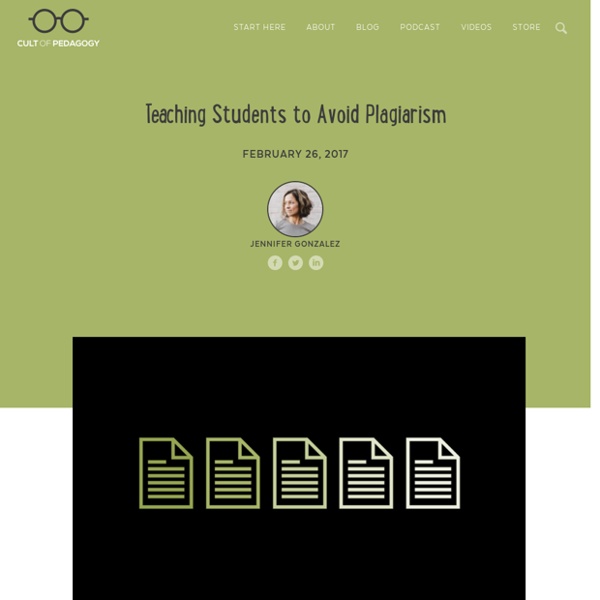



https://www.cultofpedagogy.com/preventing-plagiarism/
Related: Plagiarism • Plagiarism • Teaching Research • PlagiarismWhy Citations Matter: A Lesson in Preventing “Alternative Facts” - EasyBib Blog Today, teachers and students alike are inundated with headlines and breaking news stories. We read them in newspapers, on tablets and phones, and consume them live on television. But in a world where “fake news” and “alternative facts” threaten to cloak actual truth, educators everywhere have been presented an incredible teaching opportunity. How Social Media Encourages Plagiarism (and Six Ways You Can Fight It) Has the ubiquity of social media given plagiarism new life? Sharing other people’s thoughts, jokes and artwork on the Internet is an everyday act. We repost so much so frequently that some platforms, such as Facebook, have been compelled to develop their own citation rules to combat plagiarism. Even so, students spend much of their time in an environment where authorship is not held in high regard. It’s no wonder, then, that plagiarism is on the rise.
TeachersFirst: Embracing Reseach - Grades 3-5 Research/Information literacy projects with students grades 3-5 Do your students understand the difference between reading fiction and reading informational texts? How much practice have your students had reading for information? Preventing Plagiarism in Essays Plagiarism. It's the dirtiest of dirty words in the education world. Yeah, there's "cheating" and "bullying" and—must we say it?—"pre-calculus," but as far as intellectual honesty goes, plagiarism is pretty much the trump card.
Types of Plagiarism Infographic LoginBuy Credits Custom Search Types of Plagiarism in Research Infographic Related Researcher Insights into the Types of Plagiarism & Attribution Issues (Interactive Chart) Buy Credits Lecture, essay, cheat, repeat… plagiarism, why it's endemic and 10 ways to avoid I sat through a one hour talk (lecture) on plagiarism this week, where the speaker (University plagiarism bod), showed not a single citation but plenty of anecdotal bullet points. There was even a bit of plagiarism from another plagiarism expert. As the old adage goes, when students copy, it is plagiarism; academics call it research. What threw me was the complete absence of any critical thought around the nature of the problem. This is a cat and mouse game, where predictable, often identical assignments (largely long-form essays) are set, students procrastinate, share, cut and paste and increasingly purchase essays, only to wait sometimes weeks for often sparse feedback and a solitary grade.
TeachersFirst: Embracing Reseach - Middle School Research/Information literacy projects with students in middle grades How will you help students to build a good search? You might want to begin by showing the short video Web Search Strategies in Plain Englishproduced by Common Craft. Search terms, keywords, relevant vocabulary and related topics can be organized using a mindmapping tool like MindMeister or Drop Mind. How will your students know whether the web content they find is worthwhile? Try one of TeachersFirst ‘s reviewed resources to teach website evaluation: How the ‘Contract Cheating’ Industry Has Gotten More Aggressive in Recruiting Students This is the first of a three-part series on the “cheating economy.” Look for part two next week, about new efforts by colleges and governments to try to prevent contract cheaters. And join us on Tuesday, January 28, for a live online discussion about the issue as part of our EdSurge Live series. It’s easier than ever for college students to find someone else to do their work for them—for a fee. In fact, such “contract cheaters” are increasingly seeking out students who aren’t even looking for these services.
Plagiarism What is Plagiarism and Why is it Important? In college courses, we are continually engaged with other people’s ideas: we read them in texts, hear them in lecture, discuss them in class, and incorporate them into our own writing. As a result, it is very important that we give credit where it is due. Plagiarism is using others’ ideas and words without clearly acknowledging the source of that information.
Talking plagiarism with students Today I spent some time with students discussing the issue of plagiarism. It’s an important issue to discuss, and one that I would prefer to cover at the start of the year rather than nearer the end of it, but I take heart from the fact that we are having these important discussions with our student population. I thought I’d share some of the resources I used to put my presentation together. First up, I think it’s important to note that one of the General capabilities that need to be addressed in the upcoming Australian Curriculum is Ethical behaviour.
TeachersFirst: Embracing Reseach - Primary Students Research/Information literacy projects with primary students Do your students understand the difference between reading fiction and reading informational texts? How much practice have your students had reading for information?